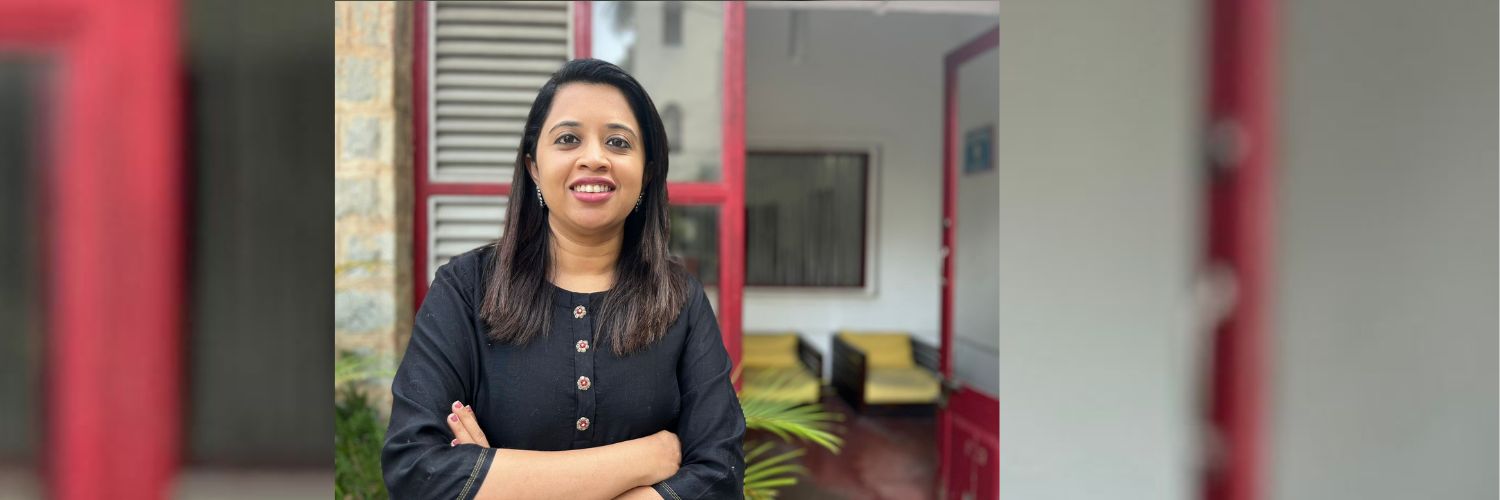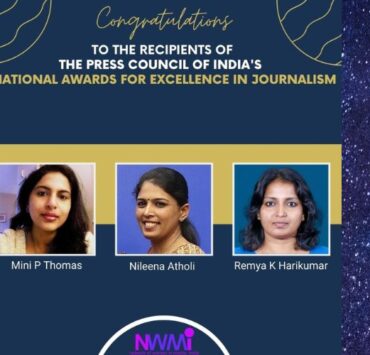
Acceptance speech of Dhanya Rajendran, Chameli Devi Jain awardee for Outstanding Woman Mediaperson 2022. Dhanya Rajendran is the co-founder and the Editor-in-Chief of The News Minute.
Someone told me that a good speech starts with an anecdote. I don’t know if that’s true or not — but here’s mine. In 2013/14, I was unemployed after quitting a national news channel, and was wondering what to do with my life. Should I become a party planner? Should I look for other TV jobs? Or maybe — I should start a news website. I thought that would be simple enough — start one www.Something.com and that’s it! I didn’t even realise it costs money… I had been a journalist for over a decade, my co-founder Chitra Subramaniam was a veteran. We both knew how to do stories, so just do those stories and put them up — that’s it right? Today, as we struggle with everything that plagues digital news media in this country, from govt overreach, to facing court cases and defamation and being targeted constantly, I sometimes laugh at myself, while my husband and co-founder, Vignesh, cries about why he ever decided to start The News Minute with me…
From then to today, standing here in front of all of you with this award, after working on one of the biggest investigative stories of the year, has been an exhilarating journey. I want to thank The Media Foundation for this honour. I am very, very, happy, and grateful for the recognition.
The small anecdote is done.
Now, I want to today talk about the investigation I worked on a few months ago with my team — what we in the newsroom call the ‘Chilume story’. This story is not just about corruption and theft of voter data in some constituencies in Bengaluru. To me, this is the story of India today — the story of stripping away rights of citizens, the story of political greed — the story of how the vision for this country as a democracy, as outlined in our Constitution, is being eroded… not even slowly, I think it’s happening at breakneck speed!
In August 2022, a journalist running a Kannada digital news outlet called Prathidvani approached us with a piece of information from a whistleblower. We were told that a top minister was involved in collecting voter data illegally. Minister. Illegal. Our antennas were up immediately. We investigated the story for two months. At many points, it seemed like there was no story, or at least there was no big story. Officers we asked questions to, dissuaded us. We were unable to establish the links. We were even unsure what the illegality was. And then one fine day, the man who was helming this voter data collection operation threatened our team. This is the kind of situation that often makes journalists retreat- a combination of doubt and threats. We, however, knew one thing. If we had ruffled so many feathers just in the beginning of our pursuit, there must be something sinister behind it all.
We doubled down, as journalists must do when needed, and decided that this story needs to be told. Even if this wasn’t a traditional story with an individual ‘villain’ that is palatable to a large chunk of readers. Because what matters is that we do what we can through our journalistic pursuit to safeguard democracy.
The Chilume story is proof that democracy is being hit at the very root, at the basics — that lists were being made to potentially remove voters from electoral rolls. Particularly, Muslim and Dalit voters. It was a reminder that just because we hold elections, we don’t become a robust democracy.
Legislators are bribed with crores of rupees to jump parties after they win elections. The chair of the Governor is used for political mathematics and to undermine democratically elected governments. Those who speak truth to power are jailed. Rules are brought in without legislative oversight to make it almost impossible for independent media to function in this country. How does a journalist, whose job it is to find the truth and bring it to the people, stop herself from losing her morale in this atmosphere?
It’s difficult. But every once in a while, a story comes your way that brings you strength to go on.
The Chilume story was published in November 2022 and it had an immediate impact. The agency that was collecting voter data illegally was barred from doing any work for the government. The Election Commission of India appointed bureaucrats to oversee electoral rolls across Bengaluru and wanted the voter lists in three seats to be rechecked.
But this kind of an impact would not have been possible if just TheNewsMinute and Prathidhvani or any other outlet published an investigation by themselves. It needed the media to come together and that’s exactly what happened. Kannada TV channels and newspapers, English newspapers in Karnataka followed up, broke new stories, and asked tough questions. This was one instance when I felt like we are all in the same fight — we are all here to speak for public good. To speak up for democracy.
But this collective power of the media has faded and the blame largely lies on the media. Over a period of time, it seems like most journalists have forgotten who they serve and have instead allowed themselves to be pawns in somebody else’s game. And those in power, have used one media house to bring down another, one story to undermine another.
I came across a recent statistic where news debates on prime time focussed more on communal issues, anti-opposition, war in Ukraine, the situation in Pakistan, but none on unemployment or inflation. Questioning the government and its functioning has been pushed to a few small newspapers and independent digital news websites, and yet, we are anti-national, we are the urban naxals, we are the ‘Chrislamocommies’.
In fact I have another anecdote, again a Karnataka related story that we did a few weeks later. It was about a BJP MP who opened the emergency exit on a flight. Ok the story is interesting, it even raises questions about how airlines and security at airports give VIP treatment to certain people, but it’s really not a story that would have cost him his job. I was taken aback by the kind of backlash for the story. And it didn’t come from anyone concerned with the story directly — but from the media. Reporters actually wrote stories that it was just a light touch and the door opened. Like Shaktimaan perhaps. And this is a trend we are increasingly seeing. Other than doing stories that are pro-government, it is the media that deploys itself as protectors of the high and mighty.
This has to change. Every journalist in this country has to realise that this is a crucial period in our history and we need to stand for equality and liberty.
Being the chairperson of Digipub, which is the largest digital media association with around 120 members, I cannot leave this stage without mentioning how digital media organisations in this country are doing cutting-edge journalism and are being persecuted for it. Digital media journalists have no accreditations, the digital media rules brought in by the government have stifled us further. Our reporters do not have the big media backing that opens doors. We are not part of the ecosystem of power and legacy. Despite all this, many hard-hitting stories have now been broken by digital media outlets. At a time when outlets have become amplifiers of the rulers, we have become the voice of the people. Many exposés and investigative pieces now find their way into smaller digital independent sites as compared to the big ones. I am immensely grateful that I am part of this ecosystem that has many names like The Wire, Scroll, NewsLaundry, The Quint, Mooknayak, Article 14, Suno India, The Cue, Boom Live and more.
Another organisation that I need to mention here is the NWMI or Network of Women in Media, India. We are a sisterhood of women media professionals who support each other and stand together. In the atmosphere that we work in, I cannot stress enough the need for organisations and associations like the Digipub and NWMI.
I want to end by recounting that when I started my career in TV journalism, I did a small investigation in my first year at the job. I was pretty proud of it and wanted it sent as an award entry. Needless to say, I didn’t win one. For the next seven years, we weren’t allowed to send for awards, as the editor believed all Lutyen awards are fixed. From that to this. So this award here matters to me a lot. And I want to thank all those who taught me journalism, all my colleagues – former and present at TheNewsMinute- my ecosystem Vignesh, Vedanth, my parents, my father-in-law and many more people. And most of all to all those people who trusted me with their stories.




